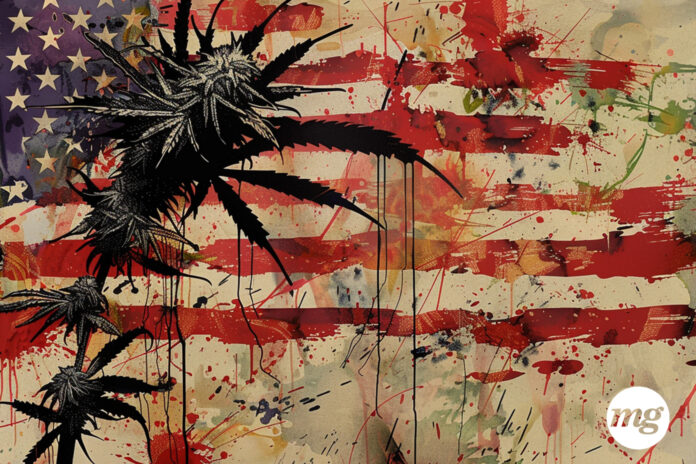WASHINGTON – It’s official: On Thursday, the Department of Justice (DOJ) proposed moving cannabis from Schedule I to Schedule III under the Controlled Substances Act (CSA). The reclassification is widely anticipated to bring tax relief and other financial benefits to cannabis businesses.
In a statement, the U.S. Drug Enforcement Administration (DEA) — the agency tasked with defining and enforcing federal drug laws in the United States — confirmed it concurs with a recommendation from the Department of Health and Human Services (HHS) that marijuana has a currently accepted medical use and low potential for abuse.
In a video announcing the development, President Joe Biden called the move “monumental.”
“Today, my administration took a major step to reclassify marijuana from a Schedule I drug to a Schedule III drug. It’s an important move toward reversing long-standing inequities,” he said.
“Today’s announcement builds on the work we’ve already done to pardon a record number of federal offenses for simple possession of marijuana,” the president continued. “And it adds to the action we’ve taken to lift barriers to housing, employment, small-business loans, and so much more for tens of thousands of Americans. No one should be in jail for using or possessing marijuana. Period. Far too many lives have been upended because of our failed approach to marijuana.”
In a separate video posted to X (formerly Twitter), Vice President Kamala Harris added, “Currently, marijuana is classified on the same level as heroin and more dangerous than fentanyl. We are finally changing that.”
Rescheduling has been anticipated since late 2022, when Biden declared the plant’s status under Schedule I “makes no sense” and asked HHS Secretary Xavier Becerra and Attorney General Merrick Garland to “expeditiously” consider whether the plant’s classification under the CSA is too severe.
“Right now, marijuana has a higher-level classification than fentanyl and methamphetamine — the two drugs driving America’s overdose epidemic,” the president said.
No immediate changes
While making a rescheduling recommendation official is a significant step toward reform, nothing will change immediately. Among other things, rescheduling requires a review by the White House Office of Management and Budget (OMB). In part, the OMB will determine whether any costs attach to rescheduling or the implementation of rules for compliance and enforcement. If the OMB determines there are costs associated with the move, the matter may require review by congressional committees responsible for oversight of the federal budget.
The DOJ’s proposal to reschedule will be posted in the Federal Register “soon,” according to a senior administration official. A sixty-day comment period will follow, during which the public may request hearings or voice opinions electronically or by mail. The comment period may be extended if the volume of responses is high, in-person hearings are required, or issues requiring additional consideration are raised. After that, the DEA will finalize the rule and any associated regulations for implementation and enforcement. Final rules typically become effective no fewer than thirty days after they’re published.
Potential impacts
As a Schedule III substance, cannabis no longer will be subject to Internal Revenue Code Section 280E, which holds that “no deduction or credit shall be allowed for any amount paid or incurred during the taxable year in carrying on any trade or business if such trade or business… consists of trafficking in controlled substances (within the meaning of schedule I and II of the Controlled Substances Act) which is prohibited by federal law or the law of any state in which such trade or business is conducted.”
In addition to enabling plant-touching businesses to deduct normal business expenses from federal income taxes, rescheduling also might change the way cannabis-related businesses are regulated under the Bank Secrecy Act (BSA), although the impact of rescheduling is substantially murkier with respect to the BSA than its impact on the application of Section 280E.
Other effects of rescheduling are even less certain. Moving marijuana to Schedule III does not render it legal under federal law, leaving open the possibility people will continue to be arrested, charged, and prosecuted for marijuana offenses.
“If the transfer to Schedule III is finalized, the regulatory controls applicable to Schedule III controlled substances would apply, as appropriate, along with existing marijuana-specific requirements and any additional controls that might be implemented, including those that might be implemented to meet U.S. treaty obligations,” the DOJ’s rescheduling announcement stated. “If marijuana is transferred into Schedule III, the manufacture, distribution, dispensing, and possession of marijuana would remain subject to the applicable criminal prohibitions of the CSA. Any drugs containing a substance within the CSA’s definition of ‘marijuana’ would also remain subject to the applicable prohibitions in the Federal Food, Drug, and Cosmetic Act.”
Not enough reform for some
Rescheduling is hailed as a game changer by most in the business community, but some advocates maintain rescheduling alone amounts to a half-measure. To such critics, anything short of descheduling falls well short of the policy reforms promised by the Biden administration and does nothing to undo damage caused by the war on drugs.
“Rescheduling marijuana to Schedule III is not the solution,” said Dasheeda Dawson, chair of the Cannabis Regulators of Color Coalition and founding director of Cannabis NYC. “Contrary to popular belief, rescheduling to Schedule III would not increase access to medical cannabis or pave the way for nationwide decriminalization. Instead, it would further entrench bureaucratic barriers, limit research and access opportunities to channels that are already historically excluding black and brown communities, and ultimately impede the state and local development of the robust and inclusive cannabis industry we’re trying to build. We cannot afford to backtrack on the progress we’ve made.”
History
DEA and HHS last examined the issue of whether to reschedule marijuana in 2016, when DEA denied two petitions to reschedule. At the time, HHS concurred that marijuana should remain a Schedule I drug because it had a high potential for abuse, did not have a currently accepted medical use, accepted safety for marijuana use under medical supervision was lacking.
Since 1996, thirty-eight states, the District of Columbia, and four federal territories have legalized the use of medical marijuana. Twenty-four states have legalized recreational use.










[…] the United States ready to reclassify marijuana from Schedule I to Schedule III, experts speculate more states will embrace legalization—a budding potential for new markets. As […]
[…] WASHINGTON – A group that seeks to “protect the public from marijuana commercialization” has asked the Department of Justice and the Drug Enforcement Administration (DEA) to add thirty more days to the public comment period currently underway as a prelude to potential rescheduling. […]
[…] tax revenue to the area along with job creation, with the Biden Administration’s moves toward rescheduling marijuana poised to open up banking, critical to businesses like Green […]
[…] months of rumors and speculation about the decision, on Thursday the Department of Justice (DOJ) proposed moving cannabis from Schedule I to Schedule III under the Controlled Substances Act (CSA). Rescheduling is expected […]